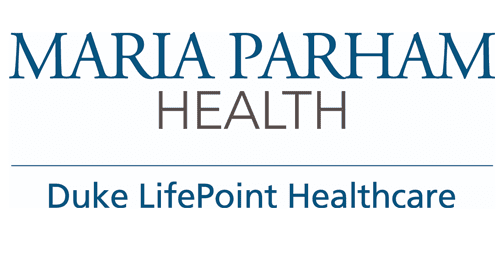Their journeys to medicine couldn’t have started more differently, but when two physicians put on their white coats during a ceremony next week their paths for the next few years will be remarkably similar.
Rashmi Saincher knew she wanted to pursue a job in the health or science field. She went straight to medical school after graduating from college; it took Jessica Y. Sanders several years – and several jobs – to put her on the path to becoming a doctor.
Sanders and Saincher will become the two newest residents in the Rural Training Track at Duke’s School of Medicine. Maria Parham Health and Duke Primary Care in Oxford are collaborators with the program, which is part of the family medicine residency in the department of family medicine and community health. The Rural Training Track was recently accredited by ACGME and Sanders and Saincher are the first to “match” with Maria Parham through the National Resident Matching Program Main Residency Match.
The June 30 white coat ceremony, hosted by Maria Parham Health, marks for the two physicians the beginning of a three-year commitment with the rural training track, which focuses on meeting primary care shortage needs in rural North Carolina. Both women said they are excited to begin the program. “We did all this work and it’s finally here and we’re starting the next leg of our journey,” Sanders told John C. Rose on Tuesday’s Town Talk. Saincher, who attended St. George’s Medical School in London, identified a mixture of excitement and nervousness in advance of the white coat ceremony. “It’s going to be a proper white coat,” she said. “It will be a very different feeling to be addressed as ‘doctor’ instead of ‘medical student,’” Saincher added.
During the first year of the program, the residents will spend a majority of their time at Duke University Hospital and Duke Regional, as well as Maria Parham Hospital and Duke Primary Care in Oxford. Over the next two years, their time will be spent mainly in Henderson and Oxford.
Maria Parham CEO Bert Beard said Tuesday that having the residents working at the hospital sends a positive message to the community. “It’s a big deal to have a residency program,” Beard told WIZS Tuesday. “And it’s a huge deal to have one associated with Duke University.”
Being a part of the rural training track sends “a signal to the region we serve that our partnership with Duke is strong and is growing,” and that Maria Parham is committed to the long-term health and well-being of patients in the community.
Those patients will benefit as well, Beard said. The physicians who are participating in the residency program are licensed, with some limitations, to write orders and care for patients. The plan is to have 12 residents within five years participating in the program – four in Year 3, four in Year 2, and four in Year 1.
The program will give them a lot more training and hands-on experience, Sanders said, mainly because they will be working more closely with patients in the rural setting. Beard said it’s a way to “cultivate the importance and the joy of serving as a primary care provider in a rural community.”
“I feel that the best cases and the best experiences in connecting with the community actually lie in the rural area,” Saincher said. “One thing that this pandemic has shown us is that every corner of society deserves the best care and I’m really excited to be able to help deliver that care and also to be able to improve my own skills in the process.”
Both physicians will go through a variety of different rotations in different areas of medical care; Saincher said she especially looks forward to working at the VA Hospital in Durham and in the areas of geriatrics and palliative care.
Sanders also looks forward to working at the VA. “Obviously, they are a very under-served population,” she noted. She also is interested in women’s health so she looks forward to the OB-GYN rotation.
Sanders said her “real-world” experiences between undergraduate school and medical school helped shape her approach to medicine. “I know Duke has wonderful mentors and providers,” she said, noting the importance of having that type of resource for support.
Saincher said her approach is to take every moment as a learning opportunity, “realizing that this is such a unique and great experience to grow. We’re all helping each other out the best way we can,” she said.
(This article and audio are not a paid ad.)
